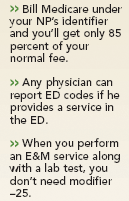Article
Coding Cues
Answers to your questions about...incident-to billing; reporting ED codes; E&M service and urninalysis
Incident-to billing
I saw a 70-year-old patient to check his uncontrolled Type II diabetes. After this initial visit, he had a follow-up appointment with my NP to discuss any reactions to the insulin. I was in the office that day, but not in the exam room with them. Can I bill the NP's service "incident-to"?

You should bill this encounter under the NP's identification number. You didn't establish a plan of care for this patient's medical problems, so this visit wouldn't satisfy Medicare's incident-to guidelines. Medicare would pay the NP's services at 85 percent of the physician's rate.
Reporting ED codes
An ED physician asked me to see a patient in the ED and then take over the patient's care. Can I submit an ED visit even though I'm not an ED physician?
Yes. A common misconception is that only ED physicians can report ED services (99281-99285). Any physician can report the ED codes if he provides a service in the ED. This doesn't mean, however, that an ED code is the only choice.
According to CMS, non-ED physicians should report an ED visit for services rendered in the ED unless the service meets the criteria for a consult (99241-99245), the physician delivers critical care services (99291-99292), or the physician admits the patient to the hospital (99221-99223, 99218-99220, or 99234-99236).
In your case, because the ED physician transferred care to you, you should report an ED visit, such as 99282.
Some private payers, however, may insist that only ED physicians can use ED service codes 99281-99285. Check with your payers to learn their rules.
E&M service and urinalysis
Do I need to use modifier –25 when I submit both a urinalysis and an E&M code?
No. When you perform an office visit and also provide an ancillary service such as a lab test to determine a diagnosis or the treatment plan, you can report both services without appending modifier –25 (significant, separately identifiable E&M service by the same physician on the same day of the procedure or other service) to the E&M code.
CMS doesn't require you to append modifier –25 to an E&M code when the separate service doesn't have a "global fee period." Medicare assigns global periods of 90 days to major surgeries and either zero or 10 days to certain minor procedures. Services included in these global fee periods can't be billed separately. Since the global concept doesn't apply to a urinalysis, you can bill separately, and you wouldn't attach modifier –25 to the E&M.

This information is adapted from material provided by The Coding Institute. For a free sample issue or information on how to subscribe to any of 29 specialty-specific coding newsletters, please contact The Coding Institute, 2272 Airport Road South, Naples, FL 34112; phone 800-508-2582; fax 800-508-2592; or visit http://www.codinginstitute.com.





